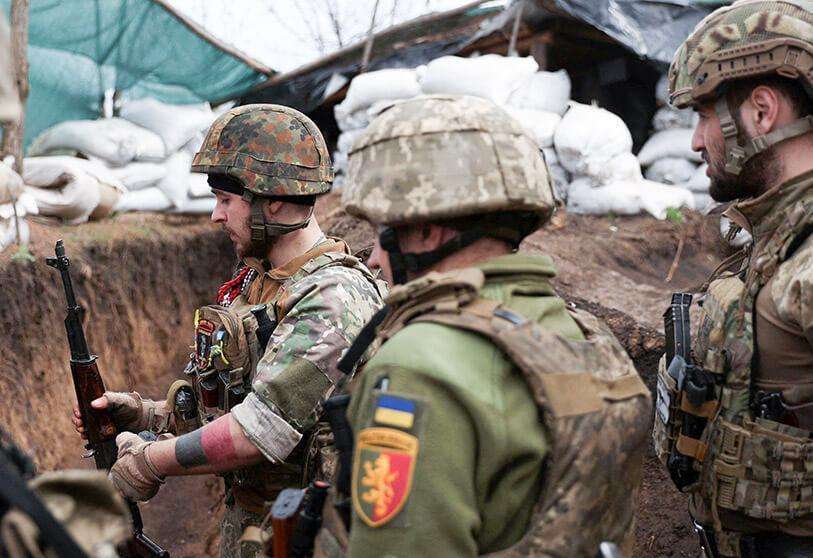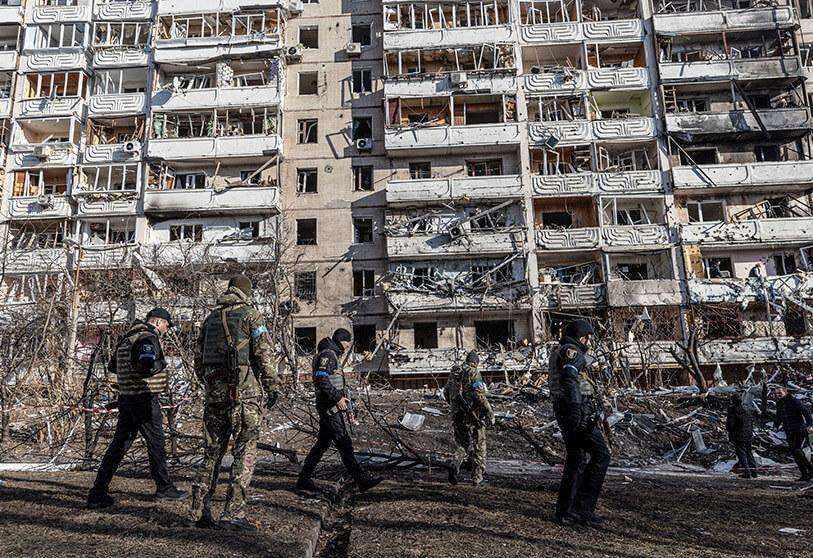Ukrainian troops withdraw to the outskirts of Severodonetsk in the face of Russian advance

106 days after the start of the invasion, Severodonetsk is once again the main focus of the fighting. In the last few hours, Ukrainian troops seem to have been forced to withdraw to the outskirts and industrial zones of the city. "The industrial zone is still ours," Serhi Haidai, the governor of the Lugansk region, said recently. "The fighting is taking place only on the streets inside the city," the Ukrainian politician announced.
Russian forces have been assaulting one of the main cities of the Donbas for several days now, with more than 100,000 inhabitants, of which only a tenth are left, according to its mayor, Oleksander Striuk.
The situation in Severodonetsk in recent days has been marked by street-to-street fighting and offensives and counter-offensives on both sides. Despite Russian military superiority, Kiev has refused to retreat and has even sent reinforcements to the city in recent days.
"The fate of our Donbas is decided here," Volodymir Zelensky said a few hours ago, noting that Ukrainian troops were still defending their positions, inflicting heavy losses on the Russian army. "It is a very hard, very difficult battle, probably one of the most difficult in this war," the Ukrainian president said of the fighting, which in its destruction and harshness is already reminiscent of Mariupol.

The capture of Severodonetsk would leave Lisichank, a twin city separated only by the Siverki Donets River, as the last Ukrainian possession in the Lugansk region. This city could also be assaulted by Russian troops in the coming days, although the river offers an obstacle that could work in favour of the defending forces. But even so, Lisichank is already being punished by Russian artillery, according to Haidai, who notes that Russian forces are "firing with a large calibre, the destruction is enormous".
Russia's artillery advantage is proving to be one of its main weapons in the war, compared to its underperformance in other domains. In this regard, according to The Independent, which cites a British intelligence report, the superiority of Russian artillery over Ukrainian artillery is 20 to 1.
The provision of MLRS rocket launching systems has been one of the main Ukrainian claims to the West. "Western weapons would end the fighting in Severodonetsk 'in two or three days'," Haidai said.
The White House announced last week that it would send four HIMARS systems to Ukraine, and the UK has said it will follow suit with the M270 system, a weaponry considered slightly superior to Russian artillery that would allow Ukraine to hit Russian targets at a long range of 70 to 80 kilometres. But it is probably too late to assist in the defence of Severodonetsk.
Video of Russian BM-21 Grad MLRS and D-20 howitzers firing on Mariupol. https://t.co/IZGhPTlBvp pic.twitter.com/w2KBvXQZDE
— Rob Lee (@RALee85) May 5, 2022
Meanwhile, Russian forces are also going on the offensive in other areas of the Donbas. British intelligence, in its daily report on Wednesday, said that Russia may have increased its efforts to make a breakthrough from southern Izium, a front that Ukraine managed to stabilise several days ago.
"Russia is probably seeking to regain momentum in this area in order to generate more pressure on Severodonetsk, and to allow it the option of advancing deeper into the Donetsk region," the report said.
Sláviansk appears to be Russia's next target, a city that is highly symbolic, having been the origin of the Donbas War in 2014 and the site of one of its most famous battles. Now, the forces of the self-proclaimed Donetsk People's Republic announced a few hours ago that a new battle for Slaviansk has already begun, according to Russian news agency TASS.
Meanwhile, uncertainty continues to mark the Ukrainian counteroffensive in Kherson. The governor of the neighbouring Nicolayev region, Vitaliy Kim, said on Wednesday that Ukrainian forces have had "some success", but that Ukraine will need more troops to make significant progress.
Russia occupied the Kherson region in the early days of the invasion, and in recent weeks has gone on the defensive, having concentrated its forces on the offensive in the Donbas. A few days ago, the Ukrainian General Staff announced the launch of a counteroffensive in the region and since then Ukrainian troops have made some progress, but the situation on the ground is still very uncertain.
Kim also warns that in the future Russia could go on the offensive in the south. "In the coming months, I think they will have a chance to attack Zaporiyia and Nikolayev," said the governor, although he said that Russia has not yet made any major regroupings for such an offensive.
???? Las autoridades militares de la República Popular de Donetsk han anunciado "el comienzo de la batalla por Slavyansk" pic.twitter.com/p3aUhdZ44C
— Descifrando la Guerra (@descifraguerra) June 9, 2022
Meanwhile, Russia continues to organise the annexation of the territories it has occupied since the start of the war, which include the Kherson region, the southern part of the Zaporiya region and part of the Kharkov region, as well as the self-proclaimed Lugansk and Donetsk People's Republics.
In the latter, a change of government took place yesterday. Denis Pushilin, leader of the People's Republic, dismissed the then prime minister, Alexander Ananchenko, replacing him with Vitali Khotsenko, a Ukrainian by birth and until then a senior official in the Russian Ministry of Industry and Trade, in a move that Pushilin justified in statements to the Russian state channel Rossiya 24 by the need to promote the process of integrating the DPRK into Russia.
Meanwhile, the Kremlin, which has set up administrations in the regions it has occupied, continues to issue passports in these territories, while Russian and local officials continue to make statements indicating their intention to annex the territories conquered by Moscow outside the Donbas.

The upsurge in fighting comes against the backdrop of a diplomatic stalemate, with peace negotiations frozen. Asked about the possibility of a summit between Vladimir Putin and Zelensky, Russian Foreign Minister Sergey Lavrov accused the Ukrainian president of a lack of seriousness in the negotiations. "[Zelensky] changes his mind every day. He has said several times that 'we will resume the conservations only if the Russians withdraw their forces to the positions of 24 February [before the start of the invasion]. This kind of approach is not serious at all," Lavrov said.
For his part, Zelensky said on Wednesday that negotiations with Moscow are not possible because "Russia can still feel its power". "Russia must be weakened and the world must do it," he concluded.
According to the United Nations, so far in the war some 6.5 million Ukrainians have already left the country and 4,200 civilians have died, although the real figures, according to the organisation, are "considerably higher".










